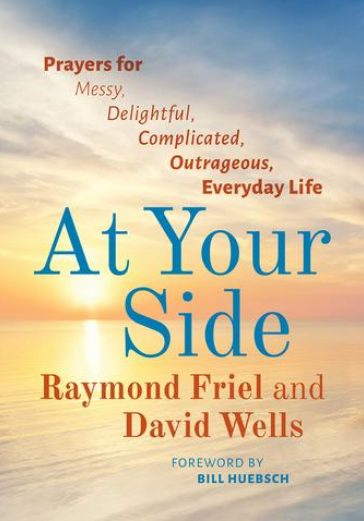
Q&A WITH AUTHORS OF AT YOUR SIDE: PRAYERS FOR MESSY, DELIGHTFUL, COMPLICATED, OUTRAGEOUS, EVERYDAY LIFE
- What is this book about?
Raymond Friel: It’s about being a human being, I suppose, a creature, trying to understand the Creator, trying to speak to the source of our life in ways that make sense to me and hopefully make sense to other people. It’s about finding grace in the ordinary and not looking to heaven to find God. It’s about the life of a middle-age married man with kids and a job trying not to fail too often, trying to come to terms with my need for God, trying to see God in those closest to me, those I don’t know, and those situations that leave me hurt and bewildered.
David Wells: We have the prayers of the Church to guide us when we can’t find the words. These are beautiful and crafted words handed on to us by saints and scholars, but they are not our words. Alongside the communal prayers of the Church that help us to worship together, we must also find our own voice in this relationship. Pope Francis encourages us to learn to talk and listen to God who desires our friendship. In this book we dare to converse with God as friend and companion in the hope that this encourages others to find their voice in prayer too.
- What inspired this book?
Raymond Friel: In the 1970s I remember of book of prayers by the French priest Michel Quoist called, Prayers of Life. They made a deep impression on me. It was the moment when I realised you could pray about very ordinary situations, you didn’t have to be on your best behaviour, so to speak. So later in life when I felt the need to write my own prayers I had “permission” to use ordinary situations and ordinary language to express myself.
David Wells: For me, the words of Pope Francis inspired this book. When summing up the primary proclamation, Pope Francis teaches us “Jesus Christ loves you, he gave his life to save you, and now he is living at your side, every day, to enlighten, strengthen and free you.” These words “At your side” struck home. The best conversations I have are not face-to-face but side-by-side. God positions himself at our side. In such an informal and unthreatening position, I talk to God, as I would talk to you. How good is that? We believe in a God who enjoys our company. At our side.
- What has been the most rewarding part of working on this book?
Raymond Friel: Writing the prayers was a kind of spiritual exercise. I found the whole process very nourishing spiritually and would encourage everybody to try and write their own prayers, or even start with a journal to record where they think God might be at work in their life in the everyday encounters.
David Wells: I enjoyed combining prayer with unlikely settings. When the train is delayed, when I’m staring at my laptop, these are also opportunities to discover sacred connections. It requires a sacramental imagination. Exercising that imagination brought ordinary circumstance to new life. Sometimes I go for a walk and the book has reminded me to invite God along. With a smile I’m quickly conscious that God was already there, enjoying the walk and looking at the view. “I did that,” God says. “I know,” I say.
- What has been most challenging?
Raymond Friel: Once you’ve written a few prayers that you convince yourself are good, you think you might be “on a roll” and the danger is, which is so often the case in spiritual life, that you become formulaic, you resort to platitudes. Maybe that’s part of praying too, I don’t know, but if you’re daring to publish something then you’re at least trying to keep it heartfelt and genuine.
David Wells: Prayer is often understood as a discipline and as a child it felt like a chore. To be casual about prayer, in the sense that it is a conversation between friends, at first sounds disrespectful. This can’t be proper prayer can it? Conversational prayer is not the opposite of solemnity. As I have got older, I discovered that prayer can reflect all our human experiences and permeate everything. Even now I can fall into the old disposition and start addressing God as if I’m writing a letter to my employer.
- Which of these prayers is your favourite?
Raymond Friel: When my children ever asked me that question, in that semi-joking way that children sometimes have of wanting to get something important out of you, I would always answer “I love you all equally.” Is that the same with what you write? I’m not sure, but certainly the prayers of mine in the book that I go back to are the ones that are the most heartfelt, that came out of a place of deepest need.
David Wells: I’m not going to do that, just because the prayers are there to reflect so many different experiences. When I’m lamenting, I have a favourite. When I’m praising, I have yet another. I’m grateful for each prayer in the book. Perhaps I particularly enjoyed “When Love chooses you” because I was challenged to write a prayer for 10,000 young people at Wembley Arena. There was a wonderful blessed moment when I read it out. 10,000 young people in silence as the prayer came to an end. The silence was so profound, it startled me.
- Final words to your readers?
Raymond Friel: I hope the book is helpful and speaks in some way to your experience of life and the spiritual journey. Prayer in my experience is not complicated. Jesus in Matthew’s Gospel warns against using many words in prayer. The irony of that never left me as I wrestled with all the words in the book. I suppose the prayers here are a kind of invitation into prayer, which should probably always tend towards silence and simplicity. Please keep in touch. You’ll find me on twitter: @friel_raymond
David Wells: Let the book help you to find your unique prayer. There is no great secret to this. You don’t have to go on a 40-day silent retreat. Get up, brush your teeth and start the prayer. Keep it going. You’ll find after a while you are never on your own. In a really wonderful way.
At Your Side: Prayers for Messy, Delightful, Complicated, Outrageous, Everyday Life can be found and purchased here.



